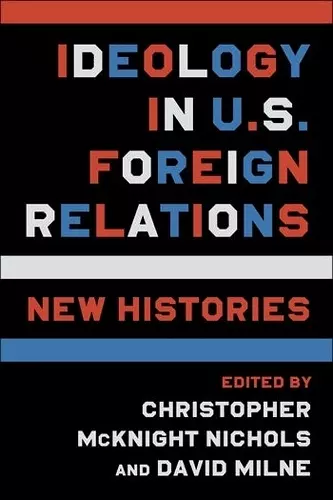Ideology in U.S. Foreign Relations
New Histories
David Milne editor Christopher McKnight Nichols editor
Format:Paperback
Publisher:Columbia University Press
Published:9th Aug '22
Currently unavailable, and unfortunately no date known when it will be back

Winner, 2023 Joseph Fletcher Prize for Best Edited Book in Historical International Relations, History Section, International Studies Association
Ideology drives American foreign policy in ways seen and unseen. Racialized notions of subjecthood and civilization underlay the political revolution of eighteenth-century white colonizers; neoconservatism, neoliberalism, and unilateralism propelled the post–Cold War United States to unleash catastrophe in the Middle East. Ideologies order and explain the world, project the illusion of controllable outcomes, and often explain success and failure. How does the history of U.S. foreign relations appear differently when viewed through the lens of ideology?
This book explores the ideological landscape of international relations from the colonial era to the present. Contributors examine ideologies developed to justify—or resist—white settler colonialism and free-trade imperialism, and they discuss the role of nationalism in immigration policy. The book reveals new insights on the role of ideas at the intersection of U.S. foreign and domestic policy and politics. It shows how the ideals coded as “civilization,” “freedom,” and “democracy” legitimized U.S. military interventions and enabled foreign leaders to turn American power to their benefit. The book traces the ideological struggle over competing visions of democracy and of American democracy’s place in the world and in history. It highlights sources beyond the realm of traditional diplomatic history, including nonstate actors and historically marginalized voices. Featuring the foremost specialists as well as rising stars, this book offers a foundational statement on the intellectual history of U.S. foreign policy.
A dream team of historians of U.S. foreign relations, under the masterly guidance of Christopher McKnight Nichols and David Milne, has rehabilitated the concept of ideology for a new historiographical moment. The results are indispensable: each of the parts is superb, and the whole is more than their sum. -- Samuel Moyn, author of Not Enough: Human Rights in an Unequal World
This is a timely and vital collection filled with brilliant insights on the often unacknowledged influence of ideology on American foreign policy. By moving far beyond a traditional framing of diplomatic history, the essays powerfully demonstrate how ideology shapes the interplay between domestic and global affairs. -- Keisha N. Blain, author of Until I Am Free: Fannie Lou Hamer’s Enduring Message to America
This edited collection centers ideology as a core analytical tool to explain the history and present of U.S. foreign relations. Oftentimes hard to discern or even hidden, ideologies plan and rationalize, and represent, actual policy. This is a huge undertaking and offers highly original and compelling work. -- Thomas Zeiler, coauthor of Globalization and the American Century
This ambitious book persuasively makes the case that historians of U.S. foreign relations/America in the world should devote more attention to ideologies and the roles ideology has played in U.S. behavior, U.S. foreign policies, and the ways Americans have understood themselves, their nation, and their role in the world. There is no book quite like this one in the field of U.S. foreign relations history. This volume will inspire new scholarship for years to come. -- Kelly J. Shannon, author of U.S. Foreign Policy and Muslim Women's Human Rights
This wonderfully expansive collection comes at a moment when understanding the central role ideas play in the making of American foreign relations has never been more important. It offers powerful genealogies for today’s authoritarian challenges to democratic norms, rising waves of white supremacy, and the deglobalization of the world economy. -- Mark Philip Bradley, editor of American Historical Review
This expansive collection shows the work of a broad diversity of ideas and voices in U.S. foreign relations history, featuring not only presidents and diplomats, but also indigenous peoples, grassroots activists, and even children. This field-expanding book will have an enduring impact on teaching and writing in foreign relations history. -- Mary Dudziak, author of War Time: An Idea, Its History, Its Consequences
Does an excellent job of revealing the complex relationship between ideational factors and purposeful action in American foreign policy. The chapters are all well written and offer a broad canvas of topics. * H-Soz-Kult *
- Winner of Joseph Fletcher Prize for Best Edited Book in Historical International Relations, History Section, International Studies Association 2023
ISBN: 9780231201810
Dimensions: unknown
Weight: unknown
520 pages